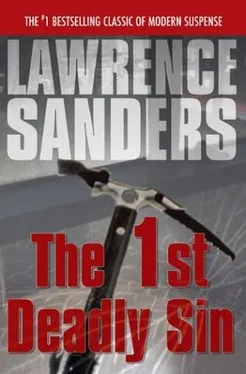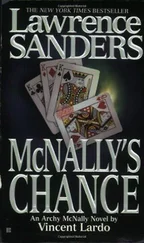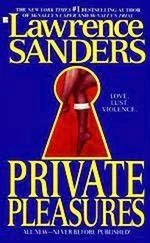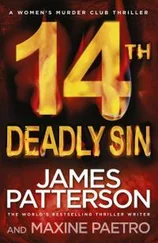Lawrence Sanders - The 1st Deadly Sin
Здесь есть возможность читать онлайн «Lawrence Sanders - The 1st Deadly Sin» весь текст электронной книги совершенно бесплатно (целиком полную версию без сокращений). В некоторых случаях можно слушать аудио, скачать через торрент в формате fb2 и присутствует краткое содержание. Жанр: Полицейский детектив, на английском языке. Описание произведения, (предисловие) а так же отзывы посетителей доступны на портале библиотеки ЛибКат.
- Название:The 1st Deadly Sin
- Автор:
- Жанр:
- Год:неизвестен
- ISBN:нет данных
- Рейтинг книги:5 / 5. Голосов: 1
-
Избранное:Добавить в избранное
- Отзывы:
-
Ваша оценка:
- 100
- 1
- 2
- 3
- 4
- 5
The 1st Deadly Sin: краткое содержание, описание и аннотация
Предлагаем к чтению аннотацию, описание, краткое содержание или предисловие (зависит от того, что написал сам автор книги «The 1st Deadly Sin»). Если вы не нашли необходимую информацию о книге — напишите в комментариях, мы постараемся отыскать её.
The 1st Deadly Sin — читать онлайн бесплатно полную книгу (весь текст) целиком
Ниже представлен текст книги, разбитый по страницам. Система сохранения места последней прочитанной страницы, позволяет с удобством читать онлайн бесплатно книгу «The 1st Deadly Sin», без необходимости каждый раз заново искать на чём Вы остановились. Поставьте закладку, и сможете в любой момент перейти на страницу, на которой закончили чтение.
Интервал:
Закладка:
Drapes of heavy brocade. Rugs of-what? Not Oriental. Greek perhaps? Or Turkish? Chinese vases filled with blooms. An Indian paneled screen, all scrolled with odd, disturbing figures. A silvered cocktail shaker of the Prohibition Era. The room had frozen in 1927 or 1931.
“Olive, thir, or a twitht of lemon?”
Hint of incense in the air. High ceiling and, between the darkened beams, painted cherubs with dimpled asses. Oak doors and window mouldings. A bronze statuette of a naked nymph pulling a bow. The “string” was a twisted wire. “Lemon, please.”
An art nouveau mirror on the papered wall. A small oil nude of a middle-aged brunette holding her chin and glancing downward at sagging breasts with bleared nipples. A tin container of dusty rhododendron leaves. A small table inlaid as a chessboard with pieces swept and toppled. And in a black leather armchair, with high, embracing wings, the most beautiful boy Daniel Blank had ever seen.
“Hello,” the boy said.
“Hello,” he smiled stiffly. “My name is Daniel Blank. You must be Anthony.”
“Tony.”
“Tony.”
“May I call you Dan?”
“Sure.”
“Can you lend me ten dollars, Dan?”
Blank, startled, looked at him more closely. The lad had his knees drawn up, was hugging them, his head tilted to one side.
His beauty was so unearthly it was frightening. Clear, guileless blue eyes, carved lips, a bloom of youth and wanting, sculpted ears, a smile that tugged, those crisp golden curls long enough to frame face and chiselled neck. And an aura as rosy as the cherubs that floated overhead.
“It’s awful, isn’t it,” the boy said, “to ask ten dollars from a complete stranger, but to tell you the truth-”
Blank was instantly alert, listening now and not just looking. It was his experience that when someone said “To tell the truth-” or “Would I lie to you?” the man was either a liar, a cheat, or both.
“You see,” Tony said with an audacious smile. “I saw this absolutely marvelous jade pin. I know Celia would love it.”
“Of course,” Blank said. He took a ten dollar bill from his wallet. The boy made no move toward him. Daniel was forced to walk across the room to hand it to him.
“Thanks so much,” the youth said languidly. “I get my allowance the first of the month. I’ll pay you back.”
He paid then, Blank knew, all he was ever going to pay: a dazzling smile of such beauty and young promise that Daniel was fuddled by longing. The moment was saved of souring by the entrance of Valenter, carrying the martini not on a tray but in his hand. When Blank took it, his fingers touched Valenter’s. The evening began to spin out of control.
She came in a few moments later, wearing an evening shift styled exactly like the black satin she had been wearing when he first met her. But this one was in a dark bottle green, glimmering. About her neck was a heavy silver chain, tarnished, supporting a pendant: the image of a beast-god. Mexican, Blank guessed.
“I went to Samarra to meet a poet,” she said, speaking as she came through the door and walked steadily toward him. “I once wrote poetry. Did I tell you? No. But I don’t anymore. I have talent, but not enough. The blind poet in Samarra is a genius. A poem is a condensed novel. I imagine a novelist must increase the significance of what he writes by one-third to one-half to communicate all of his meaning. You understand? But the poet, so condensed, must double or triple what he wants to convey, hoping the reader will extract from this his full meaning.”
Suddenly she leaned forward and kissed him on the lips while Valenter and the boy looked on gravely.
“How are you?” she asked.
Valenter brought her a glass of red wine. She was seated next to Blank on the leather sofa. Valenter stirred up the fire, added another small log, went to stand behind the armchair where Anthony coiled in flickering shadow.
“I think the Mortons’ party will be amusing,” he offered. “A lot of people. Noisy and crowded. But we don’t have to stay long.”
“Have you ever smoked hashish?” she asked.
He looked nervously toward the young boy.
“I tried it once,” he said in a low voice. “It didn’t do anything for me. I prefer alcohol.”
“Do you drink a lot?”
“No.”
The boy was wearing white flannel bags, white leather loafers, a white knitted singlet that left his slim arms bare. He moved slowly, crossing his legs, stretching, pouting. Celia Montfort turned her head to look at him. Did a signal pass?
“Tony,” she said.
Immediately Valenter put a hand tenderly on the boy’s shoulder.
“Time for your lethon, Mathter Montfort,” he said.
“Oh, pooh,” Tony said.
They walked from the room side by side. The lad stopped at the door, turned back, made a solemn bow in Blank’s direction.
“I am very happy to have met you, sir,” he said formally.
Then he was gone. Valenter closed the door softly behind them.
“A handsome boy,” Daniel said. “What school does he go to?”
She didn’t answer. He turned to look at her. She was peering into her wine glass, twirling the stem slowly in her long fingers. The straight black hair fell about her face: the long face, broody and purposeful.
She put her wine glass aside and rose suddenly. She moved casually about the room, and he swiveled his head to keep her in view. She touched things, picked them up and put them down. He was certain she was naked beneath the satin shift. Cloth touched her and flew away. It clung, and whispered off.
As she moved about, she began to intone another of what was apparently an inexhaustible repertoire of monologues. He was conscious of planned performance. But it was not a play; it was a ballet, as formalized and obscure. Above all, he felt intent : motive and plan.
“My parents are such sad creatures,” she was saying. “Living in history. But that’s not living at all, is it? It’s an entombing. Mother’s silk chiffon and father’s plus-fours. They could be breathing mannequins at the Costume Institute. I look for dignity and all I find is…What is it I want? Grandeur, I suppose. Yes. I’ve thought of it. But is it impossible to be grand in life? What we consider grandeur is always connected with defeat and death. The Greek plays. Napoleon’s return from Moscow. Lincoln. Superhuman dignity there. Nobility, if you like. But always rounded with death. The living, no matter how noble they may be, never quite make it, do they? But death rounds them out. What if John Kennedy had lived? No one has ever written of his life as a work of art, but it was. Beginning, middle, and end. Grandeur. And death made it. Are you ready? Shall we go?”
“I hope you like French cooking,” he muttered. “I called for a reservation.”
“It doesn’t matter,” she said.
The dance continued during dinner. She requested a banquette: they sat side by side. They ate and drank with little conversation. Once she picked up a thin sliver of tender veal and fed it into his mouth. But her free hand was on his arm, or in his lap, or pushing her long hair back so that the bottle green satin was brought tight across button nipples. Once, while they were having coffee and brandy, she crossed her knees. Her dress hiked up; the flesh of her thighs was perfectly white, smooth, glistening. He thought of good sea scallops and Dover sole.
“Do you like opera?” she asked in her abrupt way.
“No,” he said truthfully. “Not much. It’s so-so made up.”
“Yes,” she agreed, “it is. Artificial. But it’s just a device: a flimsy wire coat hanger, and they hang the voices on that.”
He was not a stupid man, and while they were seated at the banquette he became aware that her subtle movements-the touchings, the leanings, the sudden, unexpected caress of her hair against his cheek-these things were directorial suggestions, parts of her balletic performance. She was rehearsed. He wasn’t certain of his role, but wanted to play it well.
Читать дальшеИнтервал:
Закладка:
Похожие книги на «The 1st Deadly Sin»
Представляем Вашему вниманию похожие книги на «The 1st Deadly Sin» списком для выбора. Мы отобрали схожую по названию и смыслу литературу в надежде предоставить читателям больше вариантов отыскать новые, интересные, ещё непрочитанные произведения.
Обсуждение, отзывы о книге «The 1st Deadly Sin» и просто собственные мнения читателей. Оставьте ваши комментарии, напишите, что Вы думаете о произведении, его смысле или главных героях. Укажите что конкретно понравилось, а что нет, и почему Вы так считаете.












